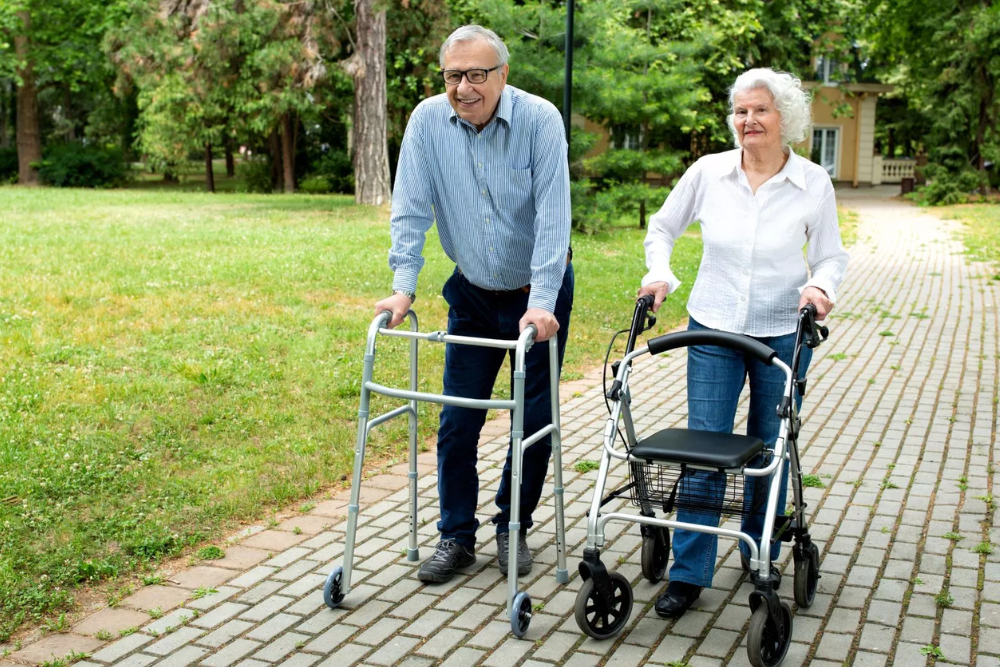The correct mobility aid can drastically influence independence, safety, and the ability to walk comfortably and dignifiedly. If you're looking to buy a rollator or a traditional walker but aren't sure which one to pick, it is essential that you know the differences between them. Rollators are walkers with wheels, seats, and brakes that usually come with more accessories than standard walkers. But how do you know it's the one for your needs without trying both?
Throughout this feature, we shall gauge the effectiveness of both rollators and walkers in stability, maneuverability, storage, and usability. Daily mobility requirements can vary a lot, so we'll discuss the most suitable walking aids for short or long walks and help you decide on one.
What is a Rollator:
A rolling walker is a walking aid with either three or four wheels, often featured with hand brakes, and sometimes it has a built-in seat and perhaps a storage basket too. Rollators, unlike regular walkers, are mainly for a more comfortable walk in the house and bring all the stuff you might need. A pediatric walker or Pediatric Rollator might be more appropriate for younger users.
Key Features of Rollators:
Wheels for effortless mobility (no lifting needed)
Comfortable seat and handle adjustments
Options for storage (baskets or bags)
Hand brakes for controlled stopping
Best for: Those who want to sit and relax during walks but still require stability.
What is a Standard Walker:
A standard walker (often called a "pick-up walker") is designed with four legs without wheels, meaning the user has to lift and carry it forward for each step they take. You might also be interested in exploring options for hospital beds for home if support at rest is also a concern.
Key Features of Walkers:
Maximum stability (perfect for problems with balance)
Without wheels (to avoid unintended rolling)
Compact and collapsible for convenient transportation
Frequently less expensive than rollators
Best for: People who don't need a seat but yet need substantial support.
Rollator vs Walker Key Differences:
|
Feature |
Rollator |
Standard Walker |
|
Mobility |
Glides smoothly on wheels |
Must be lifted to move |
|
Stability |
Good, but can roll if brakes aren’t used |
Extremely stable (no accidental movement) |
|
Seat |
Includes a built-in seat |
No seat (must use a separate chair) |
|
Storage |
Often has a basket or pouch |
Typically no storage |
|
Best For |
Outdoor use longer walks |
Indoor use, maximum support |
When Should You Choose a Rollator?
When it comes to rollators, is this the right choice if:
Need to sit and relax a lot (perfect for shopping or walks outside), a rollators for sale is a better option.
Desire more fluid motion (no lifting needed)
Prefer more storage to transport medical supplies, groceries, or purses.
Possess good arm strength but moderate balance (grip control is necessary for braking).
Use Case Examples:
Elderly people who like taking walks in parks, yet occasionally need to sit
Recovering patients who require both freedom and support
Wheeled mobility is beneficial for people with arthritis.
When Should You Choose a Walker:
If you:
Require maximal stability (perfect for people with severe balance problems)
Spend most of your time indoors (carpets and confined places work better with walkers), a walkers for sale might be best for you.
If sitting is not a priority, there is no need for a seat.
Seeking an affordable choice (walkers are frequently less expensive than rollators)
Use Case Examples:
Patients who require strict support after surgery
Seniors who are at a higher risk of falling
People with weak grips (no brakes to control)
Top Benefits of Rollators:
Smooth Mobility: Unlike lifting a walker, walking is effortless with wheels.
Built-in Seat: You don't need a separate chair to relax at any moment.
Storage Convenience: Keep necessities in the basket that is attached.
Adjustable Height: Tailor for comfort and good posture.
Ideal for Outdoors: more adept than walkers at navigating parks, sidewalks, and shops.
Top Benefits of Standard Walkers:
Superior Stability: Ideal for people who are afraid of slipping or toppling over.
Simple to Use: There are no wheels or brakes to control.
Lightweight & Portable: Compared to rollators, it is simpler to fold and move.
Affordable: Usually less expensive than wheeled solutions.
Better for Carpets: It doesn't roll away on thick rugs, making it better for carpets.
Which One is Right for You:
Still not sure? Is it necessary for me to sit while walking? → Select a rollator.
Do I have the most trouble with balance? ← Perhaps a walker is safer.
Will I primarily use it indoors? ← Walker is the most effective.
Should I take a stroll outside or go shopping? ← The best is a rollator.
Before choosing, try both choices at a medical supply store if you can. For those with respiratory needs, an oxygen concentrator can be a vital piece of equipment.
Final Thoughts:
Your final selection between a rollator and a walker will depend on your particular needs regarding mobility lifestyle, and physical abilities. Having a walker for home activities and a rollator for outdoor trips becomes the best solution for many users.
To find out which choice best promotes your safety and independence, speak with your mobility specialist or physical therapist.
Keep in mind that the ideal mobility assistance should: Increase your level of independence
Complement your everyday routine
Feel safe and at ease.
Encourage your recuperation or long-term requirements
Your comfort, self-assurance, and quality of life will all improve if you take the time to choose the right gadget. For those looking to enhance their financial well-being alongside their physical independence, exploring investment apps can be a worthwhile endeavor.
FAQs:
What is a rollator's primary benefit?
A rollator is perfect for active users because it has wheels, a seat, and storage.
Do walkers pose a greater risk than rolling devices?
Rollators need strong grips for the brakes, whereas walkers offer greater stability.
Is it possible to use these indoors?
Yes, but walkers are more adept at navigating confined areas and carpets.
Do they need to be maintained?
For smooth functioning, wheels and brakes may require periodic inspections.
Which is more suitable for travel?
Compact ones are useful for excursions, but lightweight walkers fold up quickly.

